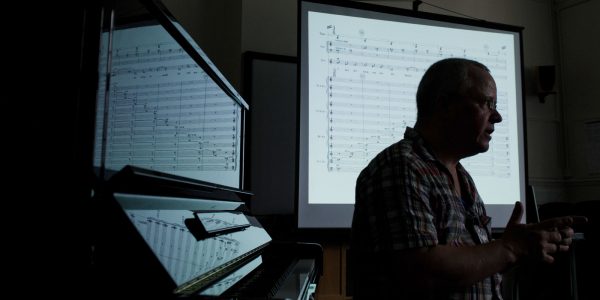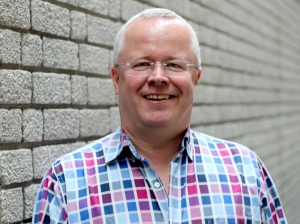Professor David Horne is a Scottish composer, pianist and teacher and was composer in residence with the Royal Liverpool Philharmonic. He is Professor of Music and Head of the Graduate School at the Royal Northern College of Music.
David participated in the initial Listen Imagine Compose (LIC) action research project in 2010, which significantly informed his practice with regards to teaching composition in the classroom. David’s initial experience with LIC was so defining that he is still involved in the initiative today. He now delivers sessions on the LIC Master’s for Educational Practice course, which supports secondary teachers to explore their practice and become better teachers of composition.
Through a range of training and events, Listen Imagine Compose provides teachers with the skills to successfully teach composition, so that more children across the UK can enjoy using their creativity, compose new music, and realise their potential.
We chatted with David to hear how participating in the initial LIC project impacted his professional development, and helped him to become a better teacher of composing.

Before being part of the action research project, where were you professionally? And what was your experience of teaching composition in the classroom?
Between 1999 and 2003 I had a position with the Royal Liverpool Philharmonic Orchestra as their Composer in Association. This meant that I was involved in a lot of education projects. I spent about twelve weeks running composition projects in schools in Liverpool, Sefton and the Wirral, across all age ranges, from Year One to Year Six to secondary, but I mostly taught GCSE and A Level students. In the 90s I taught composition at Harvard, and then taught composition at Royal Northern College of Music (RNCM) from 2001.
Throughout all of my primary and secondary school teaching roles, I was a workshop leader, rather than a traditional classroom teacher.
Can you tell us about the action research project and what prompted you to participate?
I was in one of the six teams involved and each team had a composer and an education researcher. The central research question in our group was ‘what difference would a professional composer make in the classroom?’.
When it comes to education projects, just because someone’s a composer, it doesn’t necessarily mean that they are best placed for the job of an educator – there’s a slightly different skill set, so that’s why I was invited to participate.
I was really interested in the project and the fact that it had a more structured approach to feedback and observation. As an educator I am used to being observed, but LIC offered something more – the opportunity to thoughtfully analyse and critique one’s practice from an education point of view, alongside Professor Martin Fautley.
I was also motivated to participate due to my own experiences. I had found that when running composition workshops, they would be successful and the students would create fantastic music, but on so many occasions, teachers would comment that it was a pity the project wasn’t documented. To crystallise this information in a form that would be meaningful for someone, is challenging, but yet so helpful. LIC enabled us to do just this.
How did it alter your perspective on teaching composition in the classroom? Did you feel better equipped as a result?
Yes, it certainly altered my perspective on teaching composition. For me, the project articulated the idea of intentionality, which is a fundamental part of my teaching philosophy.
In other words, rather than working with a student and telling them to do something a certain way, I was approaching it from the perspective of ‘what are you doing when you compose’? This informs all composition teaching, and especially my teaching at higher education level. I was really struck that when I read Professor Martin Fautley’s report, all the work that I was doing at secondary level was directly informing the work I was doing with my undergraduate, master’s and PHD students.
In this way I learnt a lot about my practice; there was a symbiotic relationship between my teaching at GCSE level that I could apply to higher education. This instilled a sort of curiosity and confidence in my practice. For instance, I’ve been involved in the Sound and Music Summer School every year since its inception, and realised that there were aspects that I could transfer from my teaching at RNCM, and vice-versa.
What makes Listen Imagine Compose unique or important?
Think about the name of the programme: ‘Listen, Imagine, Compose’ – these words are all such fruitful terms. What I like is that the word ‘teach’ doesn’t feature. The Master’s course isn’t a degree in teaching. Instead, the programme is about encouraging them to reflect on their own practice, which brings out the best of them. The most important thing about teaching is being able to adapt, and decide that just because you’ve always done something a particular way doesn’t mean it’s the most effective way.
Would you recommend Listen Imagine Compose, and if so, to whom?
I would definitely recommend it to any music teacher working in secondary school. Whilst LIC is specifically geared for high school, I do think it has a value for primary teachers too, as these skills are transferable.
Find out more about David’s work
Learn more about Listen Imagine Compose
Read the final report on the Action Research Project
As a charity, we need your help to continue supporting more practitioners like David. David’s story demonstrates just how beneficial this opportunity was in shaping his ongoing practice as a music educator.
With your kind contributions, we can enable more artists and educators to benefit from our programmes like Listen Imagine Compose. This will ensure that as many students as possible will have access to excellent music education.
Listen Imagine Compose is a long-term initiative that explores how composing is taught and learned in secondary schools, through research, conferences and CPD sessions. It is a partnership between Sound and Music, Birmingham Contemporary Music Group and Birmingham City University and the lead academic is Professor Martin Fautley.
If you feel passionate about inspiring and empowering the next generation of musicians, then please consider supporting us today.


